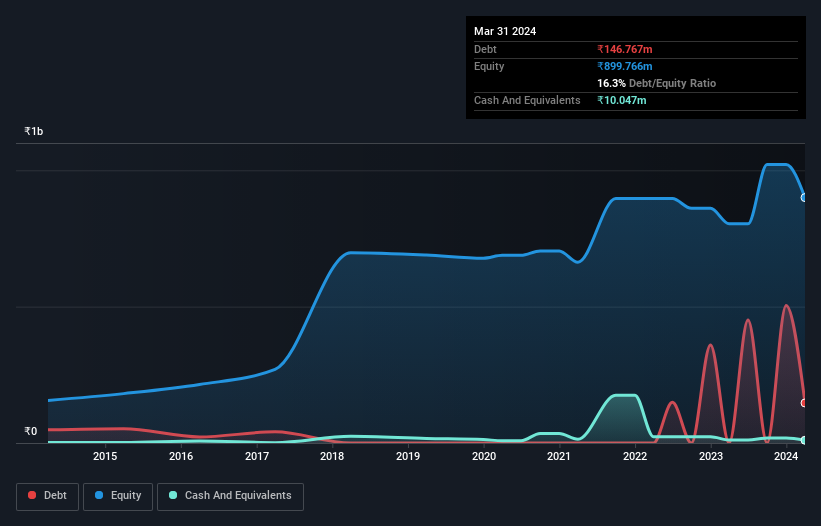
David Iben put it well when he said, 'Volatility is not a risk we care about. What we care about is avoiding the permanent loss of capital.' When we think about how risky a company is, we always like to look at its use of debt, since debt overload can lead to ruin. Importantly, Zota Health Care Limited (NSE:ZOTA) does carry debt. But is this debt a concern to shareholders?
When Is Debt Dangerous?
Debt assists a business until the business has trouble paying it off, either with new capital or with free cash flow. In the worst case scenario, a company can go bankrupt if it cannot pay its creditors. However, a more usual (but still expensive) situation is where a company must dilute shareholders at a cheap share price simply to get debt under control. Having said that, the most common situation is where a company manages its debt reasonably well - and to its own advantage. The first thing to do when considering how much debt a business uses is to look at its cash and debt together.
Check out our latest analysis for Zota Health Care
How Much Debt Does Zota Health Care Carry?
The image below, which you can click on for greater detail, shows that at March 2024 Zota Health Care had debt of ₹146.8m, up from none in one year. However, because it has a cash reserve of ₹10.0m, its net debt is less, at about ₹136.7m.

A Look At Zota Health Care's Liabilities
According to the last reported balance sheet, Zota Health Care had liabilities of ₹736.8m due within 12 months, and liabilities of ₹646.7m due beyond 12 months. Offsetting these obligations, it had cash of ₹10.0m as well as receivables valued at ₹438.4m due within 12 months. So its liabilities total ₹935.0m more than the combination of its cash and short-term receivables.
Given Zota Health Care has a market capitalization of ₹16.1b, it's hard to believe these liabilities pose much threat. Having said that, it's clear that we should continue to monitor its balance sheet, lest it change for the worse. But either way, Zota Health Care has virtually no net debt, so it's fair to say it does not have a heavy debt load! There's no doubt that we learn most about debt from the balance sheet. But you can't view debt in total isolation; since Zota Health Care will need earnings to service that debt. So when considering debt, it's definitely worth looking at the earnings trend. Click here for an interactive snapshot.
In the last year Zota Health Care wasn't profitable at an EBIT level, but managed to grow its revenue by 28%, to ₹1.8b. Shareholders probably have their fingers crossed that it can grow its way to profits.
Caveat Emptor
Despite the top line growth, Zota Health Care still had an earnings before interest and tax (EBIT) loss over the last year. Indeed, it lost ₹125m at the EBIT level. Considering that alongside the liabilities mentioned above does not give us much confidence that company should be using so much debt. Quite frankly we think the balance sheet is far from match-fit, although it could be improved with time. Another cause for caution is that is bled ₹226m in negative free cash flow over the last twelve months. So to be blunt we think it is risky. There's no doubt that we learn most about debt from the balance sheet. However, not all investment risk resides within the balance sheet - far from it. Be aware that Zota Health Care is showing 1 warning sign in our investment analysis , you should know about...
If you're interested in investing in businesses that can grow profits without the burden of debt, then check out this free list of growing businesses that have net cash on the balance sheet.
Valuation is complex, but we're here to simplify it.
Discover if Zota Health Care might be undervalued or overvalued with our detailed analysis, featuring fair value estimates, potential risks, dividends, insider trades, and its financial condition.
Access Free AnalysisHave feedback on this article? Concerned about the content? Get in touch with us directly. Alternatively, email editorial-team (at) simplywallst.com.
This article by Simply Wall St is general in nature. We provide commentary based on historical data and analyst forecasts only using an unbiased methodology and our articles are not intended to be financial advice. It does not constitute a recommendation to buy or sell any stock, and does not take account of your objectives, or your financial situation. We aim to bring you long-term focused analysis driven by fundamental data. Note that our analysis may not factor in the latest price-sensitive company announcements or qualitative material. Simply Wall St has no position in any stocks mentioned.
Have feedback on this article? Concerned about the content? Get in touch with us directly. Alternatively, email editorial-team@simplywallst.com
About NSEI:ZOTA
Zota Health Care
Develops, manufactures, and markets pharmaceutical products in India and internationally.
Adequate balance sheet minimal.
Similar Companies
Market Insights
Community Narratives




